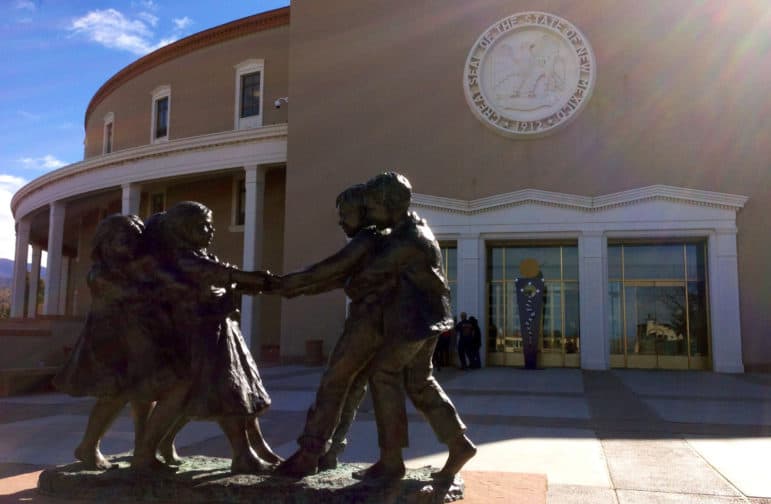
Heath Haussamen / NMPolitics.net
A statue outside the Roundhouse in Santa Fe.
Gov. Susana Martinez killed on Friday legislation that would have consolidated most local elections into one beginning in 2019.
The pocket veto was a defense of local laws requiring photo identification to vote, Martinez spokesman Chris Sanchez said.
“It would have taken away voter ID in the local jurisdictions that have implemented it,” Sanchez said. “The governor is a strong supporter of voter ID.”
Satisfying concerns about preserving local voter ID laws in Albuquerque, Rio Rancho and elsewhere was key to winning GOP support for the bill during legislative deliberations. Cities would have been allowed to opt out of consolidated elections if the bill had become law. Supporters said those that did opt out would have been allowed to keep their own rules governing elections, including requiring a photo ID to vote.
But cities that joined consolidated elections would have been governed by the state’s election code, which does not require a photo ID to vote.
After satisfying many GOP lawmakers’ concerns that cities had an option to preserve their voter ID laws, the Legislature sent House Bill 174 to the governor with bipartisan support.
Proponents said consolidating elections would increase voter turnout by making it easier for people to understand when and where they can vote and bring more attention to elections by having more candidates and issues on one ballot.
Doña Ana County Clerk Scott Krahling, who helped champion the legislation, expressed disappointment about the governor’s pocket veto.
“Low voter turnout is a real problem, especially in local elections, because the current election system is broken,” Krahling said. “Consolidating local elections is a real solution to increase voting because voters can get into the habit of voting every November. It makes sense, and it creates a solid pathway to increased voter participation.”
The bill would have consolidated elections for school districts, special hospital districts, community college districts, technical and vocational institute districts, learning center districts, arroyo flood control districts, special zoning districts, soil and water conservation districts, and water and sanitation districts beginning in 2019. Cities would have been included as well unless their governing bodies approve an ordinance opting out. In 2023 the bill would have also added conservancy district elections.
The bill would not have consolidated elections for mutual domestics or homeowner associations.
If the bill had become law, one November you would have voted in partisan races like county commission, state Legislature and U.S. Congress, and the next you would have voted in nonpartisan races the legislation would have consolidated.
Krahling pledged to continue fighting “until we get this done.”
“Democracy and elections are not successful if only a few people vote,” he said. “We need to build a voting culture where everyone votes in every election, and consolidating local elections was a giant step in the right direction.”